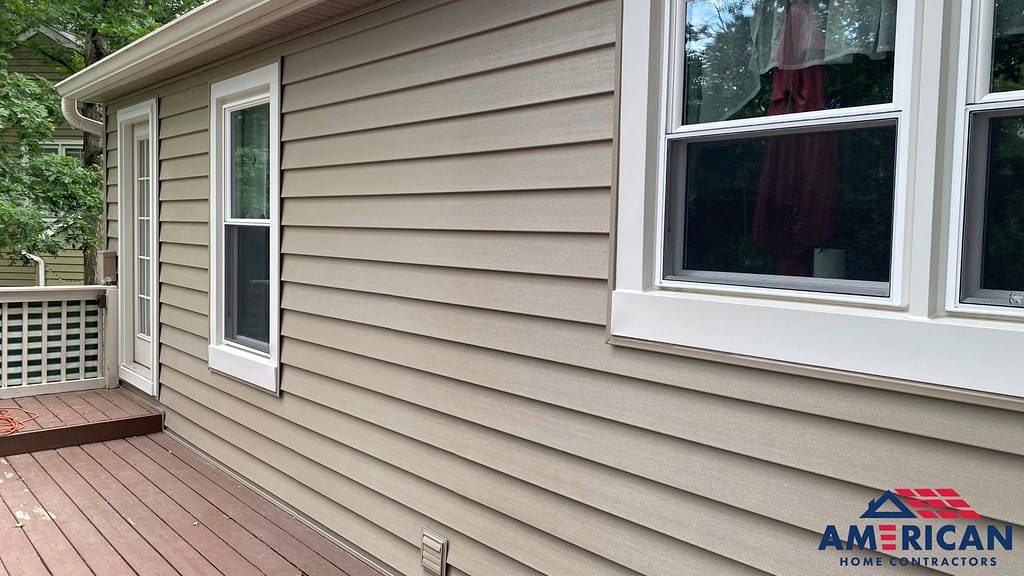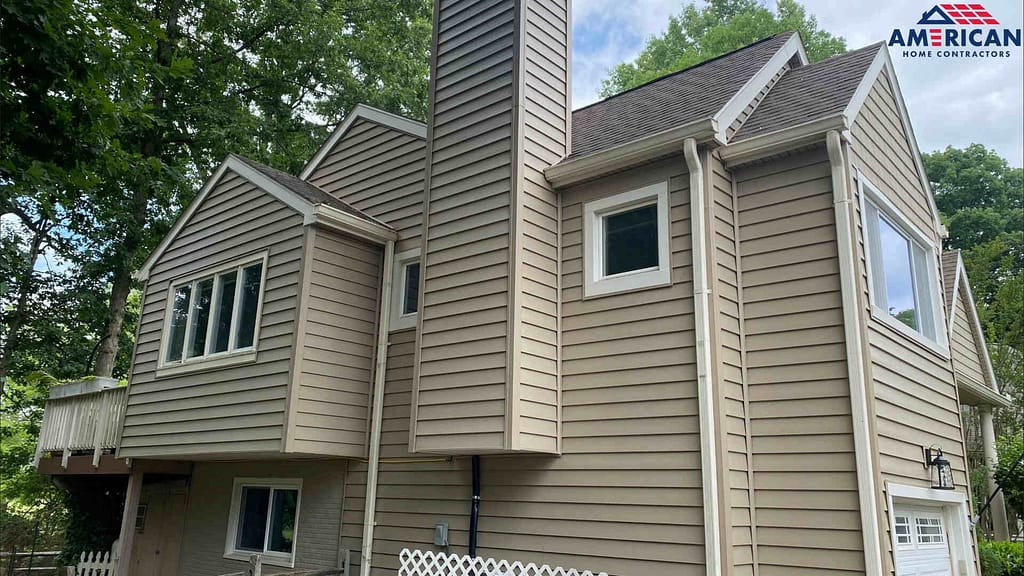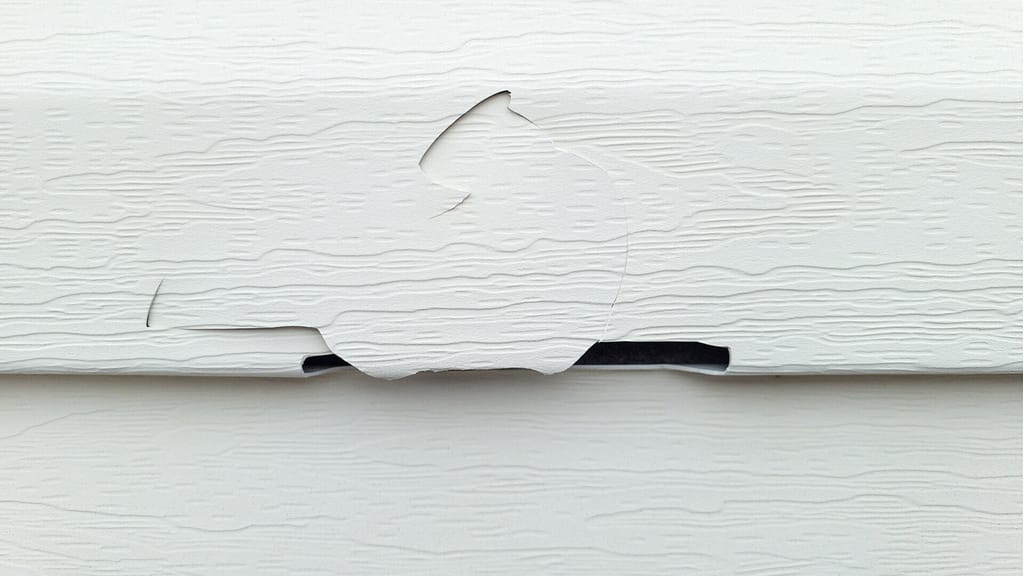
In Virginia, vinyl siding typically lasts 40 to 60 years, enduring diverse weather conditions from hot, humid summers to cold winters. This makes it a durable and low-maintenance choice for homeowners seeking both longevity and aesthetic appeal in their homes.
Table of contents
Average Lifespan of Vinyl Siding in Virginia

Vinyl siding is a durable and popular choice for homes in Virginia, largely due to its ability to withstand the varied weather conditions found throughout the state. Typically, vinyl siding can last up to 40 to 60 years if properly maintained. This impressive lifespan makes it an economical and low-maintenance option for many homeowners.
High-quality vinyl siding, when installed correctly, resists weathering, moisture, and fading from sunlight, all of which are common in Virginia’s climate. Moreover, it does not need painting and is resistant to pests and decay, which adds to its durability and long-term appeal.
Factors Influencing the Lifespan of Vinyl Siding in Virginia
When considering vinyl siding for your home in Virginia, it’s important to understand the various factors that can influence its durability and longevity. This section will explore the key elements that affect how long vinyl siding lasts, including Virginia’s unique climate conditions, the quality of the materials used, and the installation practices followed. Knowing these factors will help you make informed decisions to ensure your siding remains in excellent condition for years to come.
Climate Conditions
Virginia’s climate varies significantly from the mountains to the coast, which affects how vinyl siding wears over time. The state experiences hot, humid summers and cold winters, with varying amounts of rainfall. High humidity can cause vinyl siding to expand and contract, which might lead to warping over time if not properly installed. During summer, the intense UV light from the sun can fade the color of vinyl siding and make it brittle if the siding is of lower quality or if it’s not designed to resist UV radiation. Additionally, temperature variations between seasons can stress the material, affecting its durability and appearance.
Quality of Material
The quality of vinyl siding plays a crucial role in its overall durability and lifespan. Higher quality vinyl is typically thicker and includes additives that protect against UV radiation and improve impact resistance. These features help the siding to withstand Virginia’s climate challenges, like sun exposure and temperature fluctuations, without deteriorating quickly. On the other hand, cheaper, lower quality vinyl might not hold up as well, leading to cracking, fading, and other wear signs sooner than expected. Investing in high-quality vinyl siding means fewer worries about replacement costs and maintenance in the long run.
Installation Practices
Proper installation is crucial for ensuring the longevity and performance of vinyl siding. This process must allow for adequate flexibility so that the siding can expand and contract with the changing temperatures. If installed too tightly, vinyl siding might buckle when it gets really hot in Virginia. If it’s too loose, wind could damage it. It’s important to pick a siding company that knows how to handle these details.
American Home Contractors have distinguished themselves as a premier choice for homeowners in Virginia. Known for their aesthetic craftsmanship and energy-efficient solutions, they come highly recommended, with numerous positive reviews underscoring their commitment to quality and expert service. Whether you need top-notch siding replacement or are planning extensive renovations, choosing American Home Contractors ensures that your home’s transformation will be remarkable.
Watch this YouTube video featuring a customer review of siding replacement done by American Home Contractors.
Extending the Lifespan of Vinyl Siding
Keeping your vinyl siding in top shape not only enhances the look of your home but also extends its lifespan, ensuring it continues to protect your house for years to come. Here are some straightforward and practical tips for maintaining your vinyl siding:
- Regular Cleaning: One of the easiest ways to maintain the appearance and longevity of vinyl siding is through regular cleaning. You can wash vinyl siding with a soft cloth or a soft bristle brush, using a solution of mild soap and water. For larger areas, a power washer set to a low pressure can be effective, but it’s important to use it cautiously to avoid damaging the siding. For more guidance, read our blog on how to clean vinyl siding in Virginia.
- Routine Inspections: It’s beneficial to inspect your vinyl siding periodically, especially after severe weather conditions. Look for any signs of cracking, warping, or other damage. Early detection of these issues can save you from more costly repairs in the future. Ensure that the siding is still securely attached to your home, and check for any loose or missing pieces that may need to be reattached or replaced.
- Minor Repairs: If you find small issues during your inspection, such as a crack or loose panel, addressing them promptly can prevent more significant problems. Vinyl siding pieces are typically designed to snap into place, which can make DIY repairs feasible for homeowners. However, for more extensive damage, it might be wise to consult with a professional.
When to Consider Replacing the Siding

Vinyl siding is known for its durability, but it is not immune to aging and damage over time. There are several indicators that it may be time to replace your vinyl siding. These include widespread discoloration, the presence of multiple cracked or warped panels, and brittleness that compromises the siding’s insulation capabilities.
Additionally, if you notice issues like broken or cracked siding, mold, fungus, or mildew growth, missing nails, or damaged or missing caulking, these are signs that your siding needs attention. Addressing these issues by replacing old siding not only boosts your home’s visual appeal but also enhances its energy efficiency.
Conclusion
Vinyl siding is a great choice for homes in Virginia because it’s tough and can last a long time—from 40 to 60 years—if you take good care of it. It handles Virginia’s weather well, from hot, sunny summers to cold winters, making it a smart pick for local homes. Vinyl siding doesn’t need to be replaced often, which saves money and is better for the environment.
To keep your vinyl siding in good shape, make sure to clean it regularly, check it often for any damage, and fix small issues before they get bigger. The quality of the siding and the skill of the people who install it are very important. Choosing a well-known company like American Home Contractors, which is praised for its quality and service, will help ensure your siding is installed right. Well-kept vinyl siding makes your home look nice and adds to its value, making it a smart investment for any Virginia homeowner.
Fact checked by Adrian Catolico – 04/12/2024